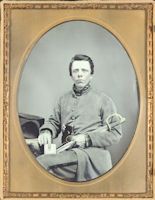[June 25th]
Early the 25th General Hancock telegraphed Zook to have everything in readiness to move at a moment’s notice on Gum Springs via Sudley Church. At 10 A. M. one of our mounted picket posts was captured, and the patrol came galloping in, followed by the enemy’s cavalry on the Warrenton road. At 10:30 A. M. we received the order to withdraw and promptly fell in and marched to Sudley Church. The telegraph operator cut the wires, removed his instruments, and rode with us. Marched out of Gainsville in fine form, a rear guard of two guns, a squadron of cavalry, and full regiment of infantry following a considerable distance in rear. Flankers were deployed on each side of the column, and in fine spirits we stepped out at a lively gait. Shortly after starting, the enemy’s cavalry completely surrounded us, keeping at a respectful distance, but in full view all the time. At half past two P. M. the head of the column reached Sudley’s Church and crossed the Bull Run river at the ford.
Opposite the ford the ground was high, and here the general posted Arnold’s battery to cover the crossing. He directed the movement of the troops on the opposite side in person and charged me with the supervision of the crossing below. There were eighty wagons and ambulances, and it was a considerable undertaking to keep them all in motion, but by much effort they were kept moving. In the course of half an hour or so an orderly rode in from the rear and reported the enemy pressing the rear guard, and a rebel battery coming up. I sent an orderly to notify Zook, and with some of the quartermaster’s officers examined the river for another ford, luckily finding one almost as good as the regular ford. Shortly afterwards, the rebel guns opened on us and dropped their shells most annoyingly. Arnold was obliged to take position and soon drove them away. Everything safely crossed, and vastly satisfied with the honor of superintending the movement of so many troops, I rejoined the general, who occupied a most commanding position on unobstructed ground. We were greatly amused at the audacity of the rebel cavalry. They completely surrounded us, keeping in full view, but confining themselves simply to watching our movements, and so we made no attempt to disturb them, not being desirous of masking our intentions. We remained in this position for an hour, resting the troops and giving the teams an opportunity of getting into good order, when an orderly from General Hancock came with directions to proceed at once to Gum Springs and there join the rest of the corps. So we marched at once, unluckily getting on the wrong road, causing considerable delay, but striking out across the country. Soon found the proper road and arrived at Gum Springs about 9 P. M.
On the route we passed over the old Bull Run battlefield and at the junction of a railroad crossing saw hundreds of human skeletons bleached white as snow, a ghastly monument of those who had fallen in the great cause. We were considerably depressed by this horrible side of war, and I noticed the soldiers were anxious to hurry away.
The evening was a typical campaign bivouac, and around a cheerful camp fire we sat down to a substantial supper, afterwards regaling ourselves with a toddy prepared by the general’s trusty man, Ferguson; the fatigues and anxieties of the day all forgotten in the glorious and exhilirating surroundings of a thousand camp fires and the music of innumerable bands.











